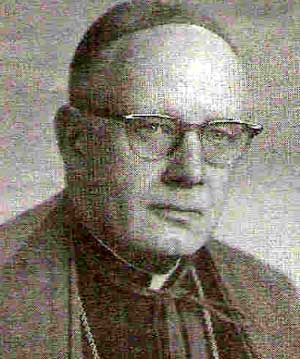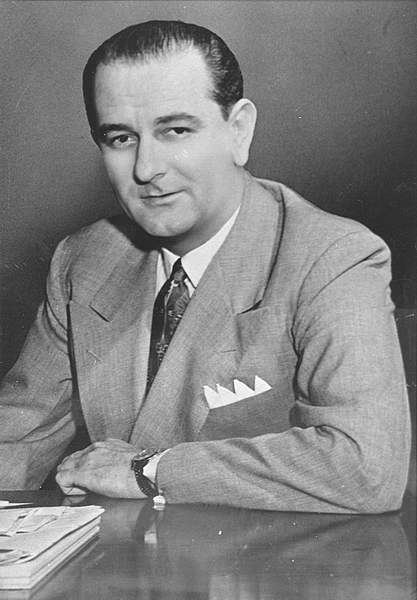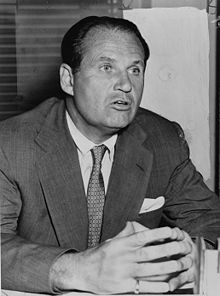The 1963 Awardees

Most Rev. George H. Guilfoyle
(1913-1991)
AB 1935New York, NY
George Guilfoyle, who served as Bishop of Camden, NJ, received the John Carroll Award in ceremonies held at the Waldorf-Astoria Hotel in New York, NY on Oct. 12, 1963.
Rev. Guilfoyle was born in New York in 1913, graduated from Regis High School in 1931, and received his undergraduate degree from Georgetown College in 1935. While on the Hilltop, Guilfoyle served as President of the Yard, President of the Philodemic, and the winner of the Hamilton Medal for oratory. He received a law degree from Fordham in 1939, but opted for the seminary over a legal career, and was ordained in 1944.
At the time of his award, Guilfoyle served as executive director of Catholic Charities for the Archdiocese of New York. It was not until 1964 that he was elevated to bishop, serving as auxiliary bishop of New York for four years before becoming bishop of Camden in 1968, from which he served until retiring in 1989.
Bishop Guilfoyle died in 1991 at the age of 79.
Dr. Harry H. Hefferan
(1890-1971)
DDS 1914Norwalk, CT
Harry Hefferan, a longtime alumni volunteer in southern Connecticut for more than a half-century, received the John Carroll Award in ceremonies held at the Waldorf-Astoria Hotel in New York, NY on Oct. 12, 1963.
" Born in Danbury, Dr. Hefferan was graduated from Danbury high school in 1911," wrote the Bridgeport Post in a 1971 obituary. "He was graduated from Georgetown Dental School in 1914. Dr. Hefferan was a member of the Connecticut State Dental association which honored him several years ago for having practiced for more than 50 years. He was a member of the Alumni Senate of Georgetown University's Alumni Association. In 1962 [sic], along with Lyndon B. Johnson, then vice president of the United States, and three others, he received the John Carroll award from Georgetown University. Dr. Hefferan was a member of Msgr. Finn Council Knights of Columbus; the Catholic Club of Norwalk and past director of that club; and a past director and 50 year member of the Kiwanis club."

Hon. Lyndon B. Johnson
(1908-1973)
Honorary degree, 1964Johnson City, TX
Lyndon Baines Johnson, whose vision of a "Great Society" changed the course of 20th Century America, received the John Carroll Award in ceremonies held at the Waldorf-Astoria Hotel in New York, NY on Oct. 12, 1963.
If asked who the only U.S. president to have received the John Carroll Award, most Georgetown alumni would suggest Bill Clinton, but it was LBJ that was so honored. Born in 1908 in Stonewall, TX and graduated from Southwest Texas State Teachers College, Johnson arrived in the Nation's Capital in 1931, following a teaching assignment among Hispanic school children in Cotulla, TX. In later years, he recalled that "I shall never forget the faces of the boys and the girls in that little Welhausen Mexican School, and I remember even yet the pain of realizing and knowing then that college was closed to practically every one of those children because they were too poor. And I think it was then that I made up my mind that this nation could never rest while the door to knowledge remained closed to any American."
A legislative secretary to Rep. Richard Kleberg (D-TX), Johnson saw law school as an opportunity to burnish his credentials, and enrolled at Georgetown in the fall of 1934. In 1935, he was called back to Texas to serve as chairman of the Texas National Youth Administration, one of the job agencies of Franklin Roosevelt's New Deal. He returned to Washington in 1937 as a congressman and while he never returned to school, Johnson was by all accounts proud of his association with Georgetown and proud to have been recognized by the school in these 1963 ceremonies.
From his days in Congress, to his contested victory in the 1948 U.S. Senate election, to Senate Majority leader, and later as Vice President, Johnson was a well known political figure. The John Carroll dinner was one of LBJ's last public appearances as Vice President, as he was sworn in as President six weeks later.
A conservative Democrat, Johnson saw civil rights as something that he would not let go unanswered as President, even at the risk, as he put it, of losing the South for a generation. "Until justice is blind to color, until education is unaware of race, until opportunity is unconcerned with the color of men's skins, emancipation will be a proclamation but not a fact." His two years of legislative initiatives were the most sweeping legislation by any American president since the New Deal, and no less significant.
Much can be written about LBJ, a politician larger than life. "He was to become the lawmaker for the poor and the downtrodden and the oppressed," wrote biographer Robert Caro. "He was to be the bearer of at least a measure of social justice to those whom social justice had so long been denied...By the time Lyndon Johnson left office he had ...become, above all presidents save Lincoln, the codifier of compassion, the president who wrote mercy and justice in the statute books by which America was governed."
Re-elected in 1964, Johnson chose not to run in 1968 in the midst of the Vietnam War. In failing health following his term as President, he died in 1973 at the age of 64, two days after the second inauguration of his successor, Richard Nixon.
Charles A. Perlitz Jr.
(1902-1964)
AB 1925Houston, TX
Charles Perlitz, former chairman of the board of the Continental Oil Corporation (Conoco), received the John Carroll Award in ceremonies held at the Waldorf-Astoria Hotel in New York, NY on Oct. 12, 1963.
Perlitz grew up in Houston and received his degree from the Hilltop in 1925. "He is one of Houston's boosters, and takes great delight in telling about the Lone Star State," wrote the 1925 Ye Domesday Booke in his behalf. he continued to Harvard, receiving his law degree in 1928, and returned to Houston to practice law in the petroleum industry.
Hired as an attorney for Continental in 1946, he was named executive vice president within a year and rose to chairman of the company at the time of the award, sharing his time between Houston and Conoco's corporate headquarters in New York.
Perlitz died suddenly in 1964 at the age of 61, less than nine months after receiving the award.

William A. Shea
(1907-1991)
AB 1930, LLB 1931, Honorary Degree 1971New York, NY
William (Bill) Shea, the attorney whose named became synonymous with New York sports, received the John Carroll Award in ceremonies held at the Waldorf-Astoria Hotel in New York, NY on Oct. 12, 1963.
Shea was born in New York and attended NYU before coming to Georgetown in 1928, playing one season on the Hoyas' football team and three seasons on the basketball team. He continued at Georgetown and received a law degree, eventually returning to New York for a career in corporate law but still maintaining an interest in sports: he was a part owner of an NFL farm club known as the Long Island Indians (1940-52) and a defunct NFL club known as the New York Yanks (1948-52) .
In 1958, Shea was approached by New York Mayor Robert Wagner about leading an effort to persuade a Major League Baseball team to move to New York after the loss of the New York Giants and Brooklyn Dodgers the year before. Finding no takers, he lobbied for an expansion team which was awarded in 1962 as the New York Metropolitans, which soon became known as the Mets. In 1965, the team named its new ballpark in Flushing Meadows, NY in his honor: Shea Stadium.
"Shea's connections were legendary," wrote American Lawyer magazine. "For Canadian billionaire Jack Kent Cooke, for instance, Shea pushed a private bill through Congress to make Cooke a citizen overnight, instead of having the future Washington Redskins owner wait the mandatory five years." Shea then became a minority owner in the club. In 1972 Shea used his considerable lobbying skills to convince the National Hockey League to award an expansion team now known as the New York Islanders.
Bill Shea practiced law at the firm he co-founded, Shea and Gould, up to his death in 1991 at the age of 84.